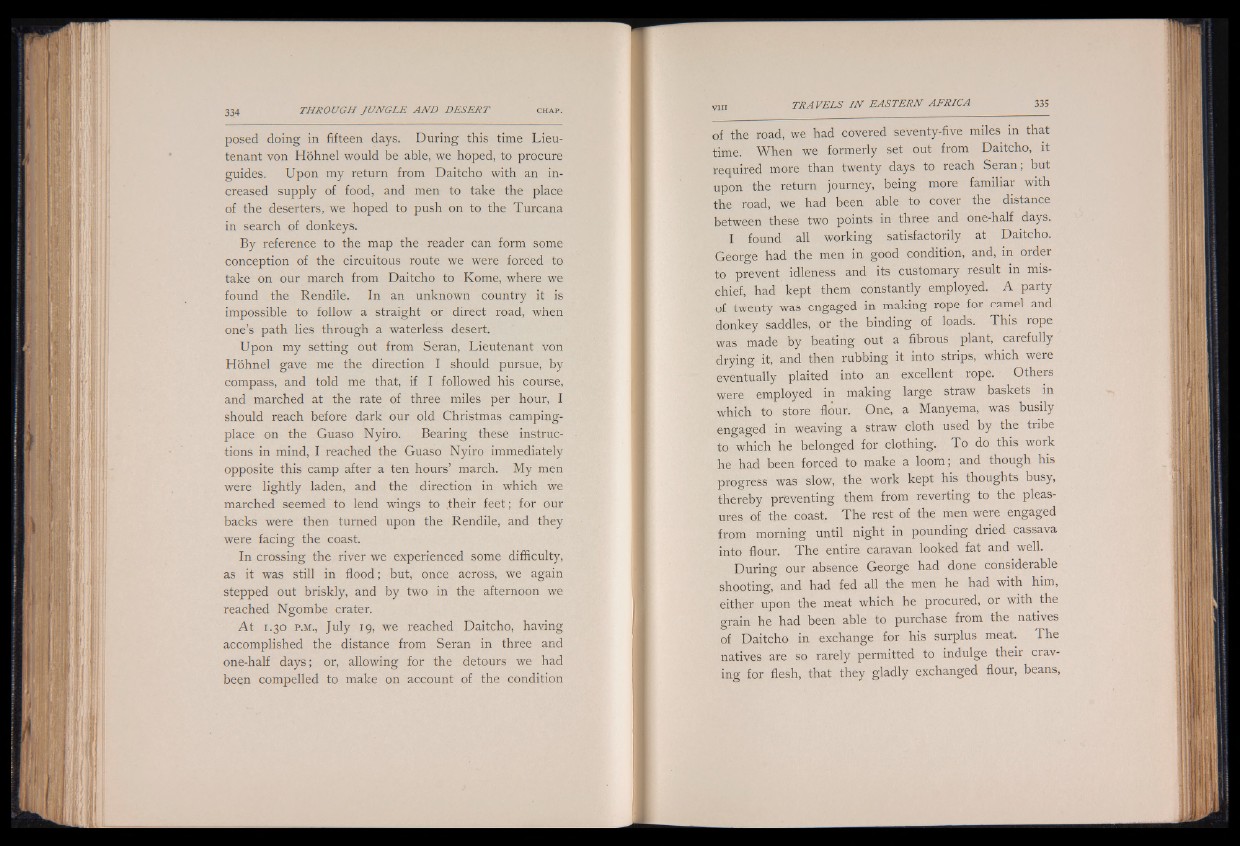
posed doing in fifteen days. During this time Lieutenant
von Hohnel would be able, we hoped, to procure
guides. Upon my return from Daitcho with an increased
supply of food, and men to take the place
of the deserters, we hoped to push on to the Turcana
in search of donkeys.
By reference to the map the reader can form some
conception of the circuitous route we were forced to
take on our march from Daitcho to Kome, where we
found the Rendile. In an unknown country it is
impossible to follow a straight or direct road, when
one’s path lies through a waterless desert.
Upon my setting out from Seran, Lieutenant von
Hohnel gave me the direction I should pursue, by
compass, and told me that, if I followed his course,
and marched at the rate of three miles per hour, I
should reach before dark our old Christmas camping-
place on the Guaso Nyiro. Bearing these instructions
in mind, I reached the Guaso Nyiro immediately
opposite this camp after a ten hours’ march. My men
were lightly laden, and the direction in which we
marched seemed to lend wings to .their feet; for our
backs were then turned upon the Rendile, and they
were facing the coast.
In crossing the river we experienced some difficulty,
as it was still in flood; but, once across, we again
stepped out briskly, and by two in the afternoon we
reached Ngombe crater.
A t 1.30 p .m ., July 19, we reached Daitcho, having
accomplished the distance from Seran in three and
one-half days; or, allowing for the detours we had
been compelled to make on account of the condition
of the road, we had covered seventy-five miles in that
time. When we formerly set out from Daitcho, it
required more than twenty days to reach Seran, but
upon the return journey, being more familiar with
the road, we had been able to cover the distance
between these two points in three and one-half days.
I found all working satisfactorily at Daitcho.
George had the men in good condition, and, in order
to prevent idleness and its customary result in mischief,
had kept them constantly employed. A party
of twenty was engaged in making rope for camel and
donkey saddles, or the binding of loads. This rope
was made by beating out a fibrous plant, carefully
drying it, and then rubbing it into strips, which were
eventually plaited into an excellent rope. Others
were employed in making large straw baskets in
which to store flour. One, a Manyema, was busily
engaged in weaving a straw cloth used by the tribe
to which he belonged for clothing. To do this work
he had been forced to make a loom; and though his
progress was slow, the work kept his thoughts busy,
thereby preventing them from reverting to the pleasures
of the coast. The rest of the men were engaged
from morning until night in pounding dried cassava
into flour. The entire caravan looked fat and well.
During our absence George had done considerable
shooting, and had fed all the men he had with him,
either upon the meat which he procured, or with the
grain he had been able to purchase from the natives
of Daitcho in exchange for his surplus meat. The
natives are so rarely permitted to indulge their craving
for flesh, that they gladly exchanged flour, beans,